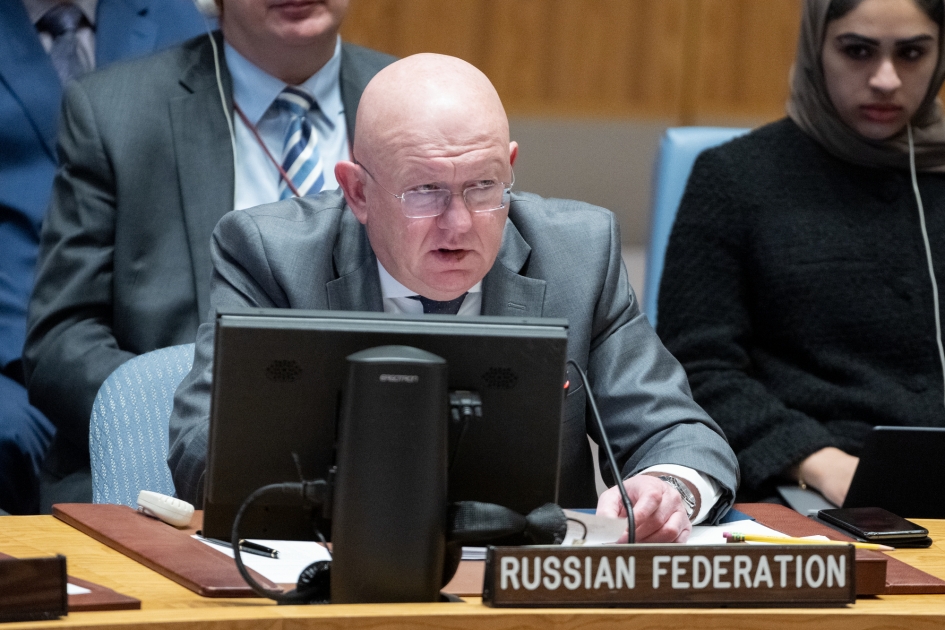Statement by Permanent Representative Vassily Nebenzia at UNSC briefing "Threats to international peace and security caused by terrorist acts: Global counter-terrorism approach – principles and the way forward"
Mme.President,
At the outset, let me extend our condolences to Ireland with regard to the death of an Irish peacekeeper in Lebanon.
Mme.President,
We are very appreciative of the delegation of India for having chosen to convene this meeting on such a relevant issue. We also express our support for all victims of terrorism who are represented by Ms.Kulthe at this briefing.
We thank USG Voronkov and CTED Executive Director Chen Weixiong for providing a detailed analysis of the current threats and the overall situation in the area of countering terrorism. We appreciate the efforts of UN OCT and CTC Executive Directorate that serve the cause of combating terrorism. Activities of these mechanisms that aspire to react to the present-day trends give us hope that the effective international counter-terrorism architecture will remain capable of responding to the new and emerging threats and challenges.
Coordinating role of the United Nations, the principle of primary responsibility of the affected states in countering terrorism, as well as respect for their sovereignty, national specifics, and priorities are the fundamental conditions that international cooperation should proceed from. We remind that the UN system and in particular its Security Council already have at their disposal all the required anti-terrorism mechanisms. It is up to member states to deliver on concrete obligations. Only then we will be able to approach the desired result – a decrease of the terrorist threat. For some, it will take a strong political will, whereas for others – a rejection of the policy of double standards.
Terrorism cannot be eradicated as long as terrorists are being used for geopolitical purposes and split into groups – “the good”, “the bad”, and “not that bad”. Unfortunately, there are plenty of such cases.
We have experienced such approach first-hand, when we carried out counter-terrorist operations on our territory back in the 90s, and also during the fight against ISIL in Syria. There was always someone to sponsor terrorists, train them in third countries, give them money and weapons, provide shelter and then status of political refugees – again in third countries. Also, there were blatant attempts to pass off outright terrorist organizations as the opposition or humanitarians. Both then and now the result has always been the same – criminals remain criminals. When they have approval and freedom to do whatever they like, they keep promoting terrorist ideology, plot and carry out terrorist attacks, or even take arms against their forbearers, as was the case with Al-Qaida and ISIL. Evil always returns like a boomerang – and then one has to call international coalitions to oppose it.
Mme.President,
In November, Secretary-General released a report on terrorist attacks carried out on the basis of xenophobia, racism and other forms of intolerance, or in the name of religion and belief. In this connection, we would like to underscore an important aspect. The report points at the regional character of such attacks. When localized, the area becomes limited to countries of Western and Eastern Europe, North America, Australia and Oceania. So there are grounds to speak about certain trends characteristic of these regions. We still have to figure out the root causes of this phenomenon in the Western community, and understand why it emerged and keeps progressing there.
We also have questions as to the conceptual approaches to countering terrorist threats. First of all, it has to do with singling out such a category as “violent extremists”. What seems a harmless word play at first turns out to have serious implications, sidetracks us from combating terrorism, leads to devaluation of our joint efforts in this field, and takes terrorists out of focus of international prosecution mechanisms.
Mme.President,
There are attempts to add human rights aspects, including gender, to UNSC documents on counterterrorism. It seems that catchy statements on this issue are often made only for statements’ sake or in order to shift focus from one’s own unflattering “track record”.
Many of those who champion human rights in counter-terrorism have so far done nothing to investigate the appalling cases of torture, humiliation, and extrajudicial executions of individuals on charges of terrorism or under investigation in prisons of Afghanistan, Iraq, and other countries that had specialized secret jails. Do we know anything of those who were convicted in such cases? Had any cases been started at all? Who was held accountable? Can our colleagues tell us anything about the way the Guantanamo prison works? Guantanamo is an outstanding example of how human rights can be violated in the counter-terrorism area. By the way, plans to shut it down were first made 10 years back. Apparently, those were just hollow promises. All of this demonstrates that when these states propose new human rights language, they believe it is applicable to whomever but themselves.
Mme.President,
In conclusion, let me thank India for having paid that much attention to the issue of consolidation of international efforts in combating terrorism in its capacity as President of the Security Council. Unfortunately, the terrorist threat is transforming quickly. It assumes new forms and learns to utilize latest technology for its purposes. We are convinced that we can only oppose it when acting together in full compliance with the norms and principles of international law, including Charter of the United Nations, and also given the central coordinating role of the UN and primary responsibility of states in matters of countering terrorism.
Thank you.
